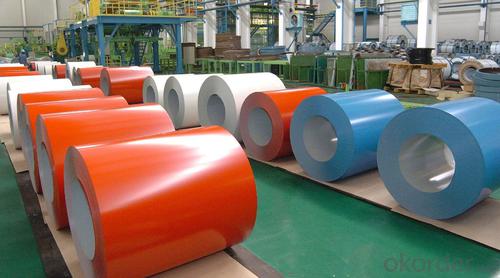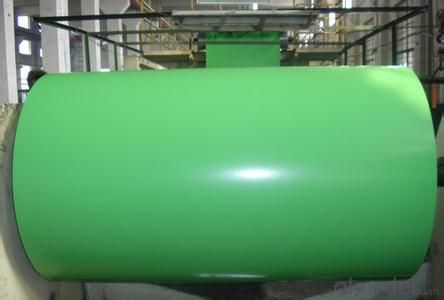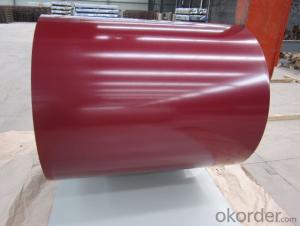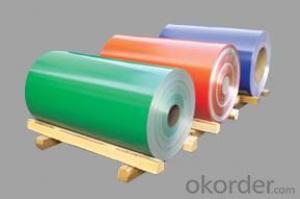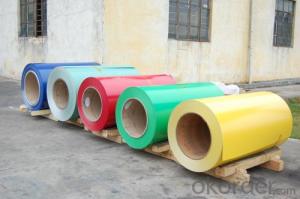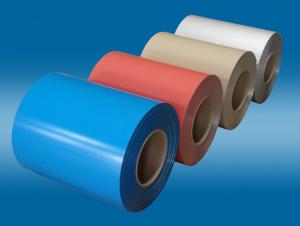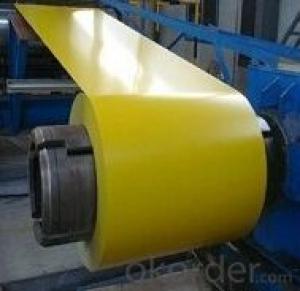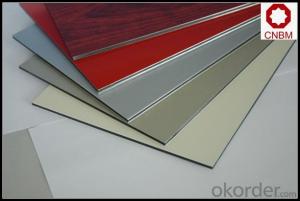Prepainted Aluminum Coil Price - Colored Coated Aluminum Coils
- Loading Port:
- China Main Port
- Payment Terms:
- TT or LC
- Min Order Qty:
- 5 m.t.
- Supply Capability:
- 10000 m.t./month
OKorder Service Pledge
OKorder Financial Service
You Might Also Like
1.Structure of Aluminum Coils Colored Coated Description
Aluminum coils color coated are of a wide range of colors, which give wonderful appearance no matter in residential and commercial constructions or great exhibition centers.
Aluminum coils color coated have been widely used in the fields of construction and decoration, electronic applications, lighting decoration, air-condition air pipes, sandwich panels and drainages etc.
2.Main Features of the Aluminum Coils Colored Coated
• Superior quality of raw material
• Reasonable and stable chemical composition
• Accurate tolerance
• Goode mechanical property
3.Aluminum Coils Colored Coated Images
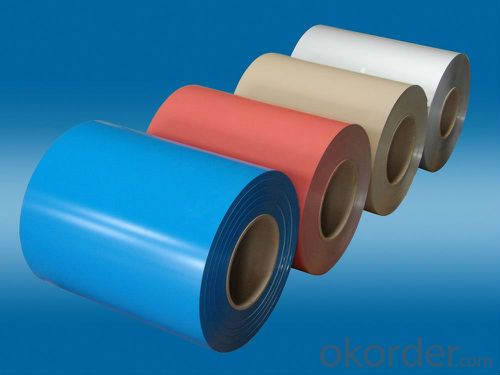
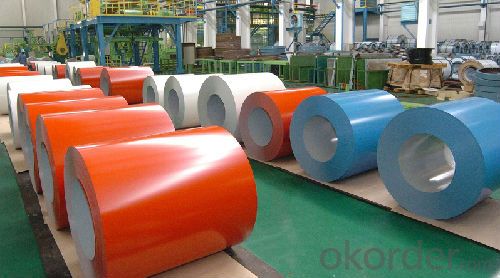
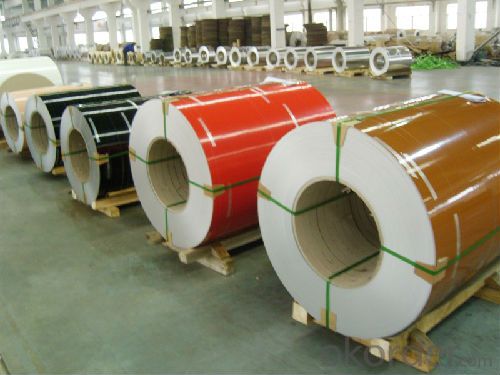
4.Aluminum Coils Colored Coated Specification
| Alloy | AA1xxx,AA3xxx,AA5xxx |
| Temper | H14,H16,H18,H22,H24,H26,H32,O/F |
| Thickness | 0.03mm-3.0mm |
| Width | 30mm-1700mm |
| Coating | PE,PVDF,Epoxy |
| Painting Thickness | Standard 16-25 Mic, max 40 Mic |
| Color | According to RAL colors or customers' samples |
| Standard | GB/T 17748-1999 |
5. FAQ of Aluminum Coils Colored Coated
A.How to guarantee the quality?
Customers are welcome to our mill to visit and check the products. Besides, we can arrange a third party to test theAluminum Coils Colored Coated products.
B.When will you deliver the products?
The Aluminum Coils Colored Coated will be delivered within 35 days after receiving advanced payment or original L/C.
- Q: Can aluminum coils be used for gutter systems?
- Yes, aluminum coils can be used for gutter systems. Aluminum is a popular choice for gutters due to its lightweight nature, durability, and resistance to rust and corrosion. It is also easy to shape and install, making it a suitable material for gutter systems.
- Q: This question seeks to understand the environmental impact of discarded aluminum coils.
- <p>Discarded aluminum coils can have significant environmental impacts. They contribute to landfill waste and can potentially leach harmful substances into the soil and water if not properly managed. Aluminum production is energy-intensive, so recycling discarded coils reduces the demand for raw materials and conserves energy. However, if left in the environment, aluminum can also contribute to pollution and disrupt ecosystems. Proper recycling and disposal methods are crucial to mitigate these effects and promote sustainability.</p>
- Q: How to pull the aluminum coil purchased into aluminum sheet?
- You can use decoiler machine, but after decoiling, the embossment of embossed aluminum sheet will become very shallow.
- Q: Are aluminum coils suitable for coil winding applications?
- Yes, aluminum coils are suitable for coil winding applications. Aluminum has excellent electrical conductivity, high thermal conductivity, and good corrosion resistance, making it a suitable material for various coil winding applications, including transformers, motors, generators, and inductors. Additionally, aluminum coils are lightweight, which can provide advantages in terms of transportation and handling.
- Q: What are the strength properties of aluminum coils?
- Aluminum coils possess several strength properties that make them highly desirable in various applications. Firstly, aluminum has a high strength-to-weight ratio, which means that it is lightweight while still maintaining good strength. This makes aluminum coils ideal for industries where weight reduction is important, such as in the automotive and aerospace sectors. Additionally, aluminum coils offer excellent corrosion resistance, even when exposed to harsh environments. This corrosion resistance is due to the formation of a protective oxide layer on the surface of the aluminum, which helps to prevent further degradation. Moreover, aluminum coils display good formability and ductility, allowing them to be easily shaped and formed into different products without compromising their structural integrity. This makes them suitable for various manufacturing processes, including rolling, bending, and stamping. Furthermore, aluminum coils possess good electrical and thermal conductivity, making them ideal for applications requiring efficient heat transfer or electrical conductivity, such as in heat exchangers or electrical wiring. In summary, the strength properties of aluminum coils include high strength-to-weight ratio, excellent corrosion resistance, good formability, and ductility, as well as efficient electrical and thermal conductivity. These characteristics contribute to the versatility and widespread use of aluminum coils in numerous industries.
- Q: Can aluminum coils be used in power generation facilities?
- Yes, aluminum coils can be used in power generation facilities. Aluminum is a highly conductive material that offers several advantages for power generation applications. It has excellent thermal conductivity, meaning it can efficiently transfer heat away from the coils, which is crucial for cooling systems in power generation facilities. Additionally, aluminum is lightweight, making it easier to handle and install compared to other metals like copper. This lightweight property also reduces the overall weight of the equipment, resulting in cost savings. Furthermore, aluminum is corrosion-resistant, which is important for power generation facilities that often operate in harsh environments. Overall, aluminum coils are a viable option for power generation facilities due to their conductivity, thermal efficiency, lightweight nature, and corrosion resistance.
- Q: ok me and my father are trying to make thermite. we have the iron oxide but the aluminum we only have paste and i was wondering would it work the same as if we had the powder.and if it is differnt will it work for the thermite and what will it take to light it.
- Etch A Sketch Thermite
- Q: How do you clean and maintain aluminum coils?
- To clean and maintain aluminum coils, you can follow a few simple steps. First, gather the necessary materials, including a soft brush or vacuum cleaner, a mild detergent or coil cleaner, a water hose, and a spray bottle. Start by turning off the power supply to the unit and ensuring that it is safe to proceed. Next, remove any debris or loose dirt from the coils using a soft brush or a vacuum cleaner with a brush attachment. Be gentle to avoid damaging the fragile fins of the coils. Once the loose dirt is removed, mix a solution of mild detergent or coil cleaner with water in a spray bottle. Spray the solution onto the coils, ensuring that it covers the entire surface. Let it sit for a few minutes to allow the solution to penetrate the dirt and grime. After the solution has had time to work, use a soft brush or a soft cloth to gently scrub the coils. Be careful not to apply excessive pressure or use abrasive materials, as this could cause damage. Pay extra attention to any areas with stubborn dirt or buildup. Once you have thoroughly cleaned the coils, rinse them off with a water hose. Ensure that all the detergent or coil cleaner is completely washed away. Make sure to direct the water flow in the opposite direction of the air flow to avoid pushing debris further into the coils. After rinsing, allow the coils to dry completely before turning the power supply back on. This will prevent any potential electrical hazards. You can use a fan or leave the coils to air dry naturally. To maintain the cleanliness of the coils, it is recommended to clean them at least once a year or more frequently if the unit is exposed to heavy dirt or debris. Regularly inspecting the coils for dirt buildup and promptly cleaning them will help maintain the efficiency and extend the lifespan of the aluminum coils.
- Q: Is it possible to utilize aluminum coils in the manufacturing of furniture?
- <p>Yes, aluminum coils can be used to make furniture. Aluminum is known for its strength, durability, and resistance to corrosion, making it an ideal material for furniture construction. It is commonly used in outdoor furniture due to its weather resistance. Aluminum coils can be formed into various shapes and sizes to create frames, legs, and other structural components of furniture. Additionally, aluminum's lightweight nature makes it easy to handle and transport, which is beneficial for both manufacturers and consumers.</p>
- Q: What is the typical yield strength-to-density ratio for aluminum coils?
- The yield strength-to-density ratio of aluminum coils can vary depending on the specific grade of aluminum being used. However, compared to many other metals, aluminum generally possesses a relatively high strength-to-density ratio. This characteristic allows it to exhibit good mechanical properties while maintaining a lightweight nature. For instance, the commonly utilized grade of aluminum for coils, known as 3003 aluminum, usually demonstrates a yield strength-to-density ratio of approximately 0.53 MPa•m^3/kg. In simpler terms, this means that for every unit of density (mass per unit volume), the material can endure roughly 0.53 megapascals (MPa) of stress before undergoing permanent deformation. There are also other high-strength aluminum alloys, including 5052 or 6061, which can possess even greater yield strength-to-density ratios, reaching up to 0.6 MPa•m^3/kg or higher. These alloys are frequently employed in applications that demand enhanced strength and durability, like those found in the aerospace or automotive industries. All in all, the yield strength-to-density ratio of aluminum coils is typically quite advantageous, rendering aluminum a popular choice for a wide array of applications that necessitate both strength and lightweight properties.
Send your message to us
Prepainted Aluminum Coil Price - Colored Coated Aluminum Coils
- Loading Port:
- China Main Port
- Payment Terms:
- TT or LC
- Min Order Qty:
- 5 m.t.
- Supply Capability:
- 10000 m.t./month
OKorder Service Pledge
OKorder Financial Service
Similar products
Hot products
Hot Searches
Related keywords



